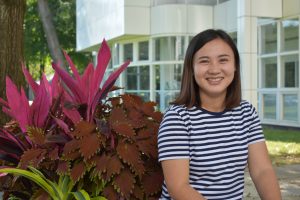The six remarkable students in our 2019-20 class of International Peacemaking Program fellows will spend a year at Hartford Seminary studying mediation, interfaith dialogue and public speaking while earning a Graduate Certificate. They come from different religions, backgrounds, and parts of the world, but they are all interested in fostering peace.
Q. If you had to choose one word to describe yourself, what would it be? And how will you use this trait in the IPP at Hartford Seminary?
A. It would be the word “consistency.” I will be consistent when it comes to study and interacting with different people with various backgrounds during IPP and in the future.
Q. Why did you choose to apply for Hartford Seminary’s IPP?
I worked with Buddhist monks and Muslim youth groups for a community development program, building peace among various religions, and coordinating public lectures on the peace process for Myanmar, Rohingya conflicts, and cultural exchange workshops with other ethnic groups. I learned many positive attitudes from others religions from my previous jobs. More importantly, I learned about a sense of “unintentional ignorance” from my fellow students in my current work at Hartford Seminary. Many students are not aware of what is going on in the country, why the religious groups are in conflict with each other, and how it results in our communities being backward in many ways. I chose to apply for IPP at Hartford Seminary to take more valuable courses that produce a meaningful, long-term impact in my community and country. Also I am sincerely grateful for receiving a scholarship from the Seminary. That means a lot to me.
Q. Who inspires you the most? And how will you reflect this person during your time in the IPP?
A. My husband. He is the one who found this program. Since I became a mother, I was hesitant to study abroad, which has always been a dream. He always inspires me to do what I love and encouraged me to apply to the IPP. The most difficult thing is leaving my daughter at home, but my husband makes us secure psychologically and physically.
Q. Where are you from and where did you go to school before Hartford Seminary? Is there an important memory/event in your childhood that led to your interest in peacemaking?
A. I am from Kachin State, the northern part of Burma/Myanmar. I graduated with a Bachelor of Science at Myitkyina University, Kachin State, in 2008. I finished an MA in International Development Studies at Chulalongkorn University, Thailand, in 2014.
While I was in primary school, I used to visit one of the Buddhist monks in the monastery in front of our school. He was very nice and welcomed all children from our school. When I had a lunch break, I used to play around in the temple. He always gave us food and told stories of the pictures hanging on the wall of the monastery. It was a good memory in my childhood.
But one incident related to that monastery made me stay away from the Buddhist. One of my cousins ran away from home and secretly stayed with the young monks for a few days. He is my aunt’s only son and my uncle passed away. When the family tried to pick up my cousin from the monastery, they sent him away to another Buddhist temple that our family did not know. We searched for many months from the information that we had. But lack of access to a telephone during that time didn’t give us the opportunity to search for him extensively. Our family lost our cousin. And he came back as a Buddhist monk after twenty years in poor health and explained that he was sent to a remote area which he didn’t know. After a year, he passed away.
My childhood memories lasted long and affected me when I grew up. I never went to the monastery anymore. I didn’t have Buddhist friends until I finished my undergraduate study. But when I started working at the Baptist convention in 2008, I gradually changed my attitude toward other religions, especially Buddhist. I have been able to work with the monks and to receive some insights from the Buddhist perspective. Those experiences inspired me to do more interfaith work.
Q. When you have free time, how do you spend it?
A. As a working mother, I rarely have free time. I mostly spend time with my family. I also volunteer at local community-based organizations and my church.
Q. Where do you see yourself going after your year at Hartford Seminary?
A. I see myself teaching at my seminary in Kachin State, Myanmar. Specifically, adding some interfaith courses in the academic curriculum of liberal arts programs and theology studies. I would also like to coordinate an interfaith dialogue project with local faith organizations – mostly Christian denominations, Islamic youth groups, and Buddhist monks. Furthermore, I plan to do research work with local researchers for religious conflicts in Myanmar especially among Buddhist , Muslim and Christian.

 Sign-up now ›
Sign-up now ›